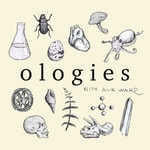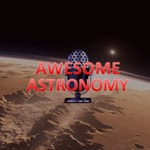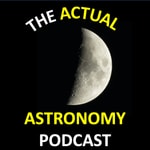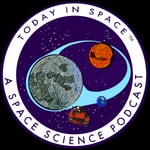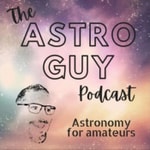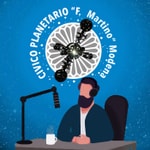The Cosmic Companion - Astronomy, Space, Technology Advancing Humanity – Détails, épisodes et analyse
Détails du podcast
Informations techniques et générales issues du flux RSS du podcast.

The Cosmic Companion - Astronomy, Space, Technology Advancing Humanity
Exploring the wonders of the Cosmos, one mystery at a time
Fréquence : 1 épisode/7j. Total Éps: 218

thecosmiccompanion.substack.com
Classements récents
Dernières positions dans les classements Apple Podcasts et Spotify.
Apple Podcasts
🇺🇸 États-Unis - astronomy
05/08/2025#48🇫🇷 France - astronomy
05/08/2025#57🇺🇸 États-Unis - astronomy
04/08/2025#35🇫🇷 France - astronomy
04/08/2025#52🇫🇷 France - astronomy
03/08/2025#49🇫🇷 France - astronomy
02/08/2025#47🇫🇷 France - astronomy
01/08/2025#46🇺🇸 États-Unis - astronomy
23/07/2025#98🇺🇸 États-Unis - astronomy
22/07/2025#93🇺🇸 États-Unis - astronomy
21/07/2025#96
Spotify
Aucun classement récent disponible
Liens partagés entre épisodes et podcasts
Liens présents dans les descriptions d'épisodes et autres podcasts les utilisant également.
See allQualité et score du flux RSS
Évaluation technique de la qualité et de la structure du flux RSS.
See allScore global : 53%
Historique des publications
Répartition mensuelle des publications d'épisodes au fil des années.
Why We Soar: From Kitty Hawk to the Stars with Cady Coleman
samedi 6 juillet 2024 • Durée 32:26
Hello all! Welcome back to The Cosmic Companion! I’m James G. Maynard.
Today, we’re talking about humanity’s drive to reach new heights — literally! From the earliest dreams of flight to the thrilling reality of space exploration, we’ll be taking a look at why we soar.
Our special guest today is none other than former NASA astronaut Cady Coleman, who will share her experiences and insights on what it takes to reach for the stars, as well as the best within us all.
But first, let’s take a journey through time to see how our fascination with flight has taken us from Kitty Hawk to the International Space Station and beyond!
This is a public episode. If you’d like to discuss this with other subscribers or get access to bonus episodes, visit thecosmiccompanion.substack.com/subscribe
Unveiling Venus: Stephen Kane Reveals Secrets and Mysteries of this Shrouded World
samedi 8 juin 2024 • Durée 35:02
What do we know about Venus? What do we not know? Stephen Kane, planetary astrophysicist at UC Riverside, joins us to uncover the science and unanswered questions about Venus.
This is a public episode. If you’d like to discuss this with other subscribers or get access to bonus episodes, visit thecosmiccompanion.substack.com/subscribe
Exploring Exploration: with Jon Waterman, Atlas of Wild America, National Geographic
samedi 4 novembre 2023 • Durée 28:00
Hello everyone!
This week on The Cosmic Companion, we explore exploration, exploring the human need to… explore. Later in the show, we’ll be talking with Jon Waterman, creator of Atlas of Wild America from National Geographic.
From the dawn of time, humans have been driven by a primal urge: the need to explore. This innate curiosity has shaped our history, propelling us from the confines of caves to the vast expanse of our planet, and beyond.
Let’s take a detour down memory lane. Somewhere between 75,000 and 50,000 years ago, a group of mobile Homo sapiens decided to take humankind’s first road trip out of Africa. Even without roads. Talk about wanderlust! This migration wasn’t just a change of scenery — it resulted in a monumental shift for our species, shaping human evolution.
Jon Waterman appears on The Cosmic Companion 4 November 2023. Creative Commons 4.0 Attribution 2023 The Cosmic Companion.
And who could forget the Ancient Greeks and Phoenicians? They were among the original sea-faring explorers, navigating the Mediterranean long before GPS and Google Maps.
Wait. [HOLD EARBUD] I’m getting a notification that we have a surprise guest on the show this week. Yes, (is this real? are you sure, Max? Wow. Ok.) Everyone, in a special chronophone interview from 330 BCE, please welcome famed navigator, astronomer, and all-around curious fellow, Pytheas.
—
χαίρετε! Name’s Pytheas. I’m just your average merchant from Massilia… what? Oh, it’s somewhere in what you would call the Provence region of southern France.
Anyway, I’ve always had this thing for stories. The wilder, the better. [FULL OPEN] More than 23 centuries before your time, I heard tales of mythical lands, strange creatures, and seas that stretch beyond the horizon. Most folks just dismissed them as sailor’s yarns. No, no. That’s a thing. You’d be surprised how many sailors enjoy macrame…
But me? Hearing these stories, I thought, “Why not go check out these legends for myself?” So, I packed my bags and set sail.
Now, let me tell you, sailing the Mediterranean is a piece of honey cake. But the Atlantic? That’s a whole different kettle of fish. Literally. The fish are different. Heh heh. Fish…
Anyway, there I was, circumnavigating the land you call Britain, or as it went by in its youth, Britannia. I always had a knack for astronomy, and I even figured out the North Star isn’t exactly north. Also, I realized that the Moon plays a role in tides. Good to know when you’re spending months or years at sea.
But I wasn’t on the boat all the time. I also got to walk around parts of Britannia, including the legendary tin mines of Cornwall. The people there call themselves the Briton Celtics. I didn’t even know they played basketball.
But, up north, the real highlight was the midnight sun. Imagine this: it’s the middle of the night, but the sun is still shining brightly. Great for getting more science done, if not for sleeping outdoors.
So there you have it. I’m just a regular guy on an extraordinary journey. Not only did I prove legends of northern Europe true, but I also wound up with a good story or two to tell.
Any idea where I can hitch a ride on a rocket?
—
Maritime voyages of Ancient Greeks and Phoenicians not only expanded their trade routes but also led to advancements in astronomy, geography, and navigation. Talk about making waves!
Then there was Marco Polo, the original globetrotter. [ARE WE TALKING BASKETBALL AGAIN?] His travels to Asia were like the ultimate vacation slideshow, except instead of awkward family photos, he brought back tales of exotic lands and cultures that blew everyone’s medieval minds.
[MARCO POLO: Dude. I LITERALLY hung out with Kublai Kahn in Xanadu. No way you’re going to top that!]
And let’s not forget about those brave souls who dared to explore the icy wilderness of Antarctica and the towering heights of Mt. Everest. These explorers faced harsh conditions and extreme dangers, but their spirit of adventure and discovery pushed them forward.
Their journeys expanded our understanding of these remote places, while testing the limits of human endurance.
Fortunately for us all, not all exploration is that strenuous, or hazardous.
Next up on The Cosmic Companion, we welcome Jon Waterman from National Geographic to the show. We’ll be discussing the human drive to explore, and his new Atlas of Wild America.
Fast forward to the 20th century, and our thirst for exploration led us to the final frontier: space. The Apollo missions were like an interplanetary camping trip — with fewer s’mores and more moon dust. When Neil Armstrong set foot on the moon in 1969, it was a giant leap not just for mankind, but for our collective spirit of discovery.
As we look to the future in the 21st Century, the spirit of exploration continues to thrive. With advancements in technology, we’re not just exploring physical spaces but also virtual ones. The rise of virtual and augmented reality technologies, together with artificial intelligence, has opened up new frontiers for exploration, allowing us to experience places and ideas in ways previously unimaginable.
As we stand on the precipice of a new era in space exploration — with missions to Mars and beyond on the horizon — we are reminded that exploration is not just about reaching new frontiers but also about pushing our limits and striving for a better understanding of our place in the universe.
As we explore the depths of our oceans, the vastness of space, and virtual worlds — we carry with us this indomitable spirit of curiosity. Our future may lie in the words of J.R.R. Tolkien, who said, “Not all those who wander are lost.”
So go ahead, pack your bags (don’t forget your towel!) [TOWEL], and let’s set off on our next adventure, becoming a better, wiser, species than we were before we took our first steps away from the familiar. Because at its core, that’s what exploration is all about.
The Cosmic Companion is starting the first half of our winter break, taking three weeks off. After all the dumb jokes and crazy costumes this year, we need it!
We will come back on 2 December, getting The Inside Story on Planets, talking with physicist Sabine Stanley from Johns Hopkins University. We’ll be discussing her new book, What’s Hidden Inside Planets? Make sure to join us then.
If you enjoyed this episode of The Cosmic Companion, please download, follow, share, send large sums of money to us, like, and comment on our show.
Have a great Thanksgiving and we will see you all on 2 December. Bring a plus one.
Clear skies!
James
The Cosmic Companion w/ James Maynard is a reader-supported publication. To receive new posts and support my work, consider becoming a free or paid subscriber.
COLD OPEN:
Oh, great. 21st-Century Earth. Smells like… [sniff-sniff] humans.
[“Wow, a real-life space chimp!”]
Yes, yes, marvel at the space chimp. I’m not here for your amusement, you know!
[‘I gotta get a selfie with you!’]
What is this with you humans and your social media?
[CARS WHIZZ BY]
This must be what they call a “rat race.” I know rats, and they would never create this sort of society. It’s like humans are in a never-ending hurry to… well, I’m not quite sure why they’re in a hurry.
[Are you here to take over?]
Take over? Why would I want to take over this mess? This world would be a much better place if everyone just watched The Cosmic Companion, you know!
[What are your future plans?]
If I ever get back to my own time, I’m going to become a sci-fi filmmaker. I’ll create a film called Planet of the Humans…
Action!
This is a public episode. If you’d like to discuss this with other subscribers or get access to bonus episodes, visit thecosmiccompanion.substack.com/subscribe
Venus, Saturn, Jupiter, and the Moon line Up on Friday Night - The Cosmic Companion Special Report 09 Dec. 2021
jeudi 9 décembre 2021 • Durée 02:49
On 10 December, Venus, Saturn, Jupiter, and the Moon will all line up just after sunset. Here's a look at what's happening, and how to get the most out of this dazzling display!
---
Send in a voice message: https://anchor.fm/the-cosmic-companion/message
Support this podcast: https://anchor.fm/the-cosmic-companion/support
This is a public episode. If you’d like to discuss this with other subscribers or get access to bonus episodes, visit thecosmiccompanion.substack.com/subscribe
Sylvia Earle Guides Us Through the Oceans - The Cosmic Companion 7 December, 2021
mardi 7 décembre 2021 • Durée 23:52
Astronomy News with The Cosmic Companion. This week, we are delighted to be joined by one of the world's most renowned oceanographers, Dr. Sylvia Earle. She's here to talk to us about her new book, National Geographic Ocean | A Global Odyssey. We're going to get an in-depth look at the oceans of our home world.
We're also going to take a look up in the sky, as a trio of planets line up with the Moon, and the Geminid meteor shower aims to delight skygazers. And, we look in on an odd planet that is really metal. No, seriously. It's metal.
---
Send in a voice message: https://anchor.fm/the-cosmic-companion/message
Support this podcast: https://anchor.fm/the-cosmic-companion/support
This is a public episode. If you’d like to discuss this with other subscribers or get access to bonus episodes, visit thecosmiccompanion.substack.com/subscribe
Geminid Meteor Shower 2021 - How to View These Falling Stars! The Cosmic Companion 3 December 2021
vendredi 3 décembre 2021 • Durée 04:36
The Geminid meteor shower arrives on the night of 13 December 2021. We take a look at how to view this display, where to look in the sky, and we take a glimpse at an alignment of planets happening on the other side of the sky. Cats may be involved for video viewers.
---
Send in a voice message: https://anchor.fm/the-cosmic-companion/message
Support this podcast: https://anchor.fm/the-cosmic-companion/support
This is a public episode. If you’d like to discuss this with other subscribers or get access to bonus episodes, visit thecosmiccompanion.substack.com/subscribe
Matthew Bothwell on The Invisible Universe - The Cosmic Companion 30 Nov. 2021
mercredi 1 décembre 2021 • Durée 27:20
Matthew Bothwell, author of The Invisible Universe, discusses the 93% of "ordinary" matter we cannot see with the human eye - radio, infrared, ultraviolet astronomy, and more...
This week on Astronomy News with the Cosmic Companion, we also look at how machine learning recently discovered hundreds of unknown planets, we explore a massive world hotter than some stars, and Dart lifts off on a mission that could help us save the planet.
---
Send in a voice message: https://anchor.fm/the-cosmic-companion/message
Support this podcast: https://anchor.fm/the-cosmic-companion/support
This is a public episode. If you’d like to discuss this with other subscribers or get access to bonus episodes, visit thecosmiccompanion.substack.com/subscribe
Five Missions to Asteroids - Dart, Lucy, Psyche, Haybusa2, and OSIRIS-REx - The Cosmic Companion 23 Nov. 2021
mardi 23 novembre 2021 • Durée 37:20
This week on Astronomy News with The Cosmic Companion, we take a close-up look at asteroids – those lumps or rock, metal, and ice racing around our solar system. We're going to examine five major missions happening right now, examining asteroids, and potentially, saving us from the fate of the dinosaurs.
Bill Bottke, Director of Space Studies at the Southwest Research Institute (SwRI) joins us talking about the Psyche mission, exploring a metal-rich asteroid for the first time.
We will also be joined by Esen Ercan Alp, senior physicist at Argonne National Laboratory, one of the few people in the world studying samples from the asteroid Ryugu returned from Haybusa2.
In addition, we examine the Dart mission – the first-ever test in space, deflecting an asteroid by impacting it with a spacecraft!
Together, we explore the OSIRIS-REx mission to Bennu, and hear from Cathy Olkin of SwRI, telling us of the journey of Lucy to the Trojan asteroids of Jupiter.
All this and more in this week's episode of Astronomy News with The Cosmic Companion!
Next week 30 November (s5/e20): Matthew Bothwell talks about his new book, The Invisible Universe. He’ll tell us about the Universe we can’t see with our eyes. Subscribe or follow today and never miss an episode!
---
Send in a voice message: https://anchor.fm/the-cosmic-companion/message
Support this podcast: https://anchor.fm/the-cosmic-companion/support
This is a public episode. If you’d like to discuss this with other subscribers or get access to bonus episodes, visit thecosmiccompanion.substack.com/subscribe
Is M51-ULS-1b the First Planet Seen in Another Galaxy? with Rosanne Di Stefano, Center for Astrophysics
mardi 9 novembre 2021 • Durée 29:27
This week on Astronomy News with The Cosmic Companion, we welcome Dr. Rosanne Di Stefano from the Center for Astrophysics to the show, talking about her work finding the first planet yet seen in another galaxy.
We also look in on the ailing Hubble Space Telescope, as that famed instrument unexpectedly shuts down. We're going to examine the first signs of water within a galaxy in the ancient Cosmos, and we will look up in the night sky as Uranus offers amateur astronomers a prime chance to view that world.
---
Send in a voice message: https://anchor.fm/the-cosmic-companion/message
Support this podcast: https://anchor.fm/the-cosmic-companion/support
This is a public episode. If you’d like to discuss this with other subscribers or get access to bonus episodes, visit thecosmiccompanion.substack.com/subscribe
Exploring ASKAP J173608.2–321635 Radio Signals with Tara Murphy, Unv. of Sydney - 2 Nov. 2021 Astronomy News with The Cosmic Companion
mardi 2 novembre 2021 • Durée 22:09
This week on Astronomy News with The Cosmic Companion, Dr. Tara Murphy from the University of Sydney joins us, looking at an odd radio burst seen near the center of the Milky Way galaxy.
We will also look at a possible discovery of a planet in another galaxy, and examine a massive solar flare that nearly missed Earth over the weekend. Finally, we will head out to Jupiter, where NASA's Juno spacecraft made some intriguing new findings, before welcoming our special guest.
---
Send in a voice message: https://anchor.fm/the-cosmic-companion/message
Support this podcast: https://anchor.fm/the-cosmic-companion/support
This is a public episode. If you’d like to discuss this with other subscribers or get access to bonus episodes, visit thecosmiccompanion.substack.com/subscribe
